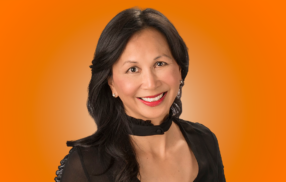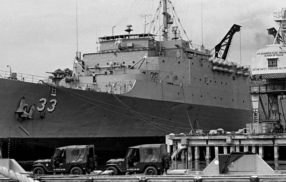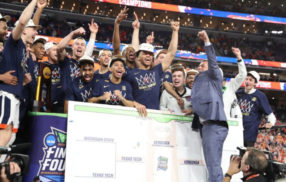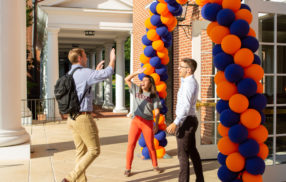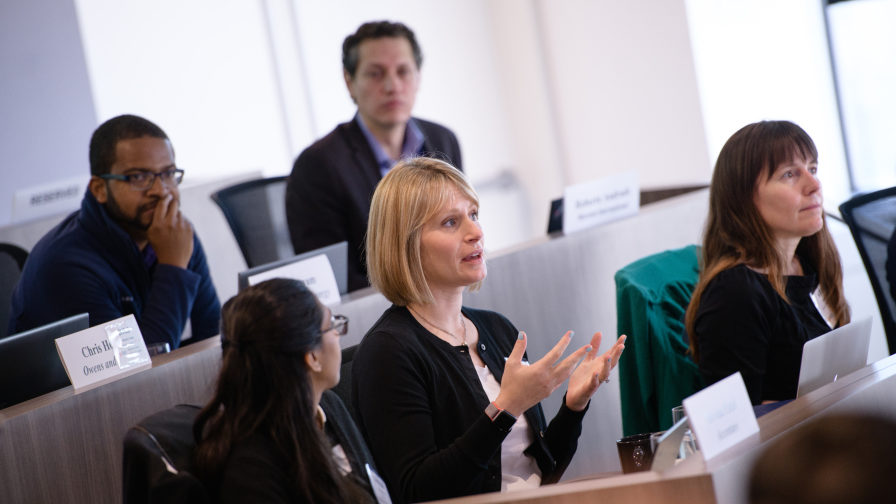
How Three Recent MSBA Grads Enhanced Their Skill Sets and Elevated Their Careers
By Core Mittenberg
The University of Virginia’s Master of Science in business analytics program is already making a huge positive difference in the lives of its graduates.
Launched in fall 2018, the innovative program offered in partnership by UVA’s Darden School of Business and McIntire School of Commerce graduated its first class in August 2019 — and the overwhelmingly positive results of the groundbreaking coursework, committed faculty, and supportive cohort have created a wealth of opportunities for its participants.
MSBA alumni Serena Patel, Connie Zhang, and Alexi Himarios each came to the program on the strength of different expertise and career trajectories. Patel, a 2015 UVA systems engineering graduate, worked on an Oracle ERP implementation project for a federal client at professional services firm Accenture. She was interested in pivoting into analytics but was hesitant about taking time off from work when she attended an MSBA information session and was convinced.
Zhang earned her business economics and public policy degree from George Washington University in 2016 and accepted a position as a business intelligence analyst and technical project manager with the Consumer Financial Protection Bureau. She had considered pursuing an MBA, but found that the MSBA program offered more hands-on interaction with analytics, data science, and technology, emphasizing an all-important business context.
A finance major from the University of Texas, Himarios held a position in corporate finance with a tech firm before deciding he wanted to make a bigger impact on society. Accepting a role at Stand Together, a community of philanthropic organizations, he provided analysis to inform leadership with its strategic decisions. Recognizing that he wanted to become someone capable of synthesizing data and using it to tell stories that drive change within an organization, Himarios researched programs and discovered UVA’s MSBA fit his needs. Appreciating the program’s flexible schedule, he often applied what he learned to his full-time job, where he received instructive feedback that he took back to class for discussion.
We recently spoke to the three alumni about how the MSBA helped them develop their analytics skill sets, meet their educational and professional goals, and have a truly life-changing experience.
What specific experiences during the program were most transformational and why?
Patel: I really enjoyed the program’s participatory nature and how it helped me stay engaged and pulled me outside my comfort zone to have insightful conversations with my classmates. I also enjoyed the balance between quantitative and qualitative work. The data analytics classes were expertly crafted for those who do not come from a technical background to quickly follow along.
Zhang: The MSBA highlighted the importance of the “wisdom of crowds” — the concept that a group of diverse individuals is collectively more insightful and innovative than an expert acting alone. While the “wisdom of crowds” is one of the most fundamental ideas of data science and analytics that I have learned from the MSBA program, it also applied to my personal MSBA experience. In other words, the people I was surrounded by made all of the difference.
During the program, my classmates spent countless hours walking me line by line through code, giving me their perspectives on how an analytical concept could be used, and sending me interesting articles about technological trends. My professors answered all of my midnight emails and were willing to video call me and my teammates at any time. When my classmates and I had suggestions for the program administrators, they were always willing to listen to us. Everyone bent over backwards to support each other, and I always knew that someone in the cohort would be there for me no matter what. Although the curriculum and administration are top-notch, UVA has a very people-centric culture that it proactively fosters, and that’s what makes it truly stand out from other programs.
Himarios: A few classmates and I competed in a Tableau Hackathon challenge a few months after starting the program, and we were able to use the visualization and storytelling skills we learned to win the competition. However, we didn’t stop there. We felt confident the tool we created could make a real impact on the lives of Blue Water Navy Vietnam veterans affected by Agent Orange. We shared our project with UVA journalists to spread the word about how our tool could help the veterans gain benefits. Our story reached many veterans who would have never heard about this tool otherwise. This was the first of many times since joining this program when I stopped and thought, “How can I use data to tell a compelling story in order to have a positive impact?” This inspiring experience was a direct result of the classes I took with Darden and McIntire professors.
What do you think the program does best?
Patel: The module projects were crafted in a way that it simulated a real-work setting. We were put into teams with people who had variety of experience and skills, had to tackle a relevant and current business problem using data, and had to present our solutions through the lens of the business. Also, the caliber of the professors sets this program a part. It was an honor to be taught by these professors, who come from two of the best business schools in the nation.
Himarios: Data is useful only if it’s utilized strategically. I was drawn to the program’s goal of sparking change and innovation in organizations and society through data analytics in business contexts. Professor Ahmed Abbasi taught several data analytics classes and drilled into us the importance of approaching problems by thinking about the art of the possible, the art of the practical, and the art of the valuable. What he meant by this — and what I think was a major takeaway from the program — is that it’s not enough to be able to apply a cutting-edge deep-learning model to a scenario if the model provides no real business value.
How has the MSBA and its coursework affected your plans and prospects?
Patel: I have been approached and sought out by many firms looking for skills that align with those gleaned from this program. I was able to switch into an analytics role within my current company and apply my knowledge in a real-life setting. I also moved into several leadership roles, accelerating my career. Neither of these would have happened as seamlessly if it wasn’t for the program.
Zhang: What I learned from my MSBA degree will be with me for the rest of my life. From analyzing my personal finances with Tableau to predicting human capital turnover at work, anything I do will be done through the tools, perspectives, and frameworks that MSBA taught me. My MSBA degree, curriculum, faculty, and classmates have actually encouraged me to start my own business, JackTech, a consulting services company focused on technology. I was confident enough to make this decision because the program empowered me with all of the right tools and analytical skills from a technical perspective, and with a network of people who will always support me. I set up my own website using the skills I learned from the MSBA, set my prices based on analytics, and was given sound business advice by my professors and classmates.
Himarios: Business leaders are facing new opportunities and risks that come along with the tools we learned in this program — and I want to be one of the leaders shaping how we use them in an ethical manner. From day one, faculty pushed us to own that responsibility. Professor Ryan Wright, who taught a digital analytics course, always asked the class after presenting certain tracking and segmentation tools, “Is this creepy or cool?” If it’s more on the former side of the spectrum, what can or should we do about it? Professor Bobby Parmar led several ethics courses on technology and privacy and challenged us to think through the human and emotional elements when making decisions.
This story originally appeared on McIntire Now.
The University of Virginia Darden School of Business prepares responsible global leaders through unparalleled transformational learning experiences. Darden’s graduate degree programs (MBA, MSBA and Ph.D.) and Executive Education & Lifelong Learning programs offered by the Darden School Foundation set the stage for a lifetime of career advancement and impact. Darden’s top-ranked faculty, renowned for teaching excellence, inspires and shapes modern business leadership worldwide through research, thought leadership and business publishing. Darden has Grounds in Charlottesville, Virginia, and the Washington, D.C., area and a global community that includes 18,000 alumni in 90 countries. Darden was established in 1955 at the University of Virginia, a top public university founded by Thomas Jefferson in 1819 in Charlottesville, Virginia.
Press Contact
Molly Mitchell
Associate Director of Content Marketing and Social Media
Darden School of Business
University of Virginia
MitchellM@darden.virginia.edu




